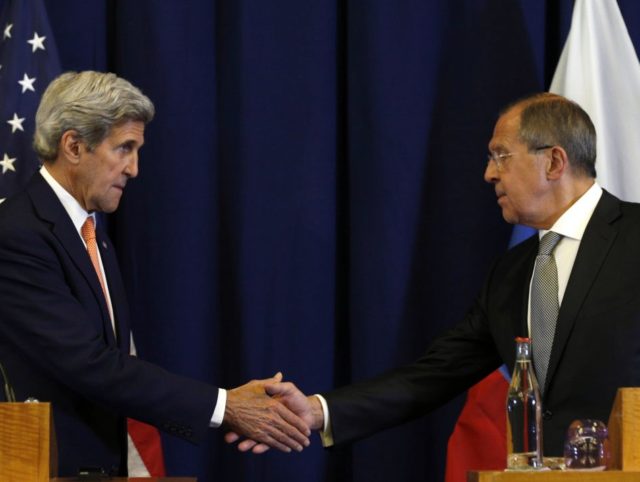U.S. Secretary of State John Kerry has reportedly made a pact with Russia to establish a ceasefire in Syria, a move that has further aggravated the increasingly deep objections from the Pentagon, CIA, and other government components to cooperating with Russia.
The primary U.S. goal of the agreement is to put an end to Syrian Dictator Bashar al-Assad’s relentless and indiscriminate fatal attacks, oftentimes targeted at women and children, and to ultimately reach a political agreement to remove Assad’s brutal regime from power, reports the New York Times (NYT).
The Pentagon, the CIA, the State Department, and even the White House have expressed reservations about the U.S.-Russia agreement.
The agreement may amount to a sort of belated appeasement to the Assad regime, only the war is already raging. It could also make overdue consequences for crossing the red line over the use of chemical weapons. The Iran/Russian-backed regime considers all opposition forces, including some backed by the United States, to be terrorists.
Some analysts are concerned that the U.S.-Russian alliance will end up eliminating most of Assad’s enemies, leaving the Syrian dictator to roam the streets with no worries on his mind.
“I think we have some reasons to be skeptical that the Russians are able or are willing to implement the arrangement consistent with the way it’s been described,” Josh Earnest, the White House press secretary, told reporters Monday, adding in what sounded like a pessimistic tone, “But we’ll see.”
“In private, he has conceded to aides and friends that he believes it will not work. But he has said he is determined to try, so that he and Mr. Obama do not leave office having failed to alleviate a civil war that has taken roughly half a million lives,” reports NYT, referring to Kerry.
Russia has helped the Assad troops, who also received support from Iran, stay afloat. The Assad troops were experiencing significant losses until Russia stepped in.
For Secretary Kerry, accomplishing his goal of reducing violence in war-torn Syria and helping the warring parties reach an agreement that will ease Assad out of office is a “matter of legacy and reputation he cannot afford to give up on.”
The Times reports:
The divide between Mr. Kerry and Mr. [Defense Secretary Ashton] Carter reflects the inherent conflict in Mr. Obama’s Syria policy. The president has come under increased fire politically for his refusal to intervene more forcefully in the five-year civil war, which the United Nations says has killed more than 400,000 people, displaced more than six million and led to a refugee crisis in Europe. But keeping large numbers of American ground forces out of Syria has also created space for Russia to assume a greater role there, both on the battlefield and at the negotiating table.
The result is that at a time when the United States and Russia are at their most combative posture since the end of the Cold War, the American military is suddenly being told that it may, in a week, have to start sharing intelligence with one of its biggest adversaries to jointly target Islamic State and Nusra Front forces in Syria.

COMMENTS
Please let us know if you're having issues with commenting.